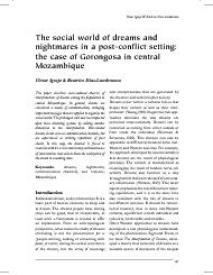The social world of dreams and nightmares in a post-conflict setting: the case of Gorongosa in central Mozambique
The paper describes socio-cultural theories of interpretations of dreams among the population in central Mozambique. In general, dreams are considered a means of communication, conveying important messages that are applied to organize the social world. The prolonged civil war has impacted upon these dreaming systems by adding another dimension to the interpretation. War-related dreams do not serve as communication channels, but are experienced as striking repetitions of past events. In this way, the dreamer is forced to reconcile with his or her own history without the use of interventions that aim to block the realization of the dream in a waking state. Keywords: dreams, nightmares, communication channels, war violence, Mozambique
Geachte bezoeker,
De informatie die u nu opvraagt, kan door psychotraumanet niet aan u worden getoond. Dit kan verschillende redenen hebben,
waarvan (bescherming van het) auteursrecht de meeste voorkomende is. Wanneer het mogelijk is om u door te verwijzen naar de bron
van deze informatie, dan ziet u hier onder een link naar die plek.
Als er geen link staat, kunt u contact opnemen met de bibliotheek,
die u verder op weg kan helpen.
Met vriendelijke groet,
Het psychotraumanet-team.
Reference:
Victor Igreja, Beatrice Dias-Lambranca | 2006
In: Intervention: the international journal of mental health, psychosocial work and counselling in areas of armed conflict, ISSN 1571-8883 | 4 | 2 | 147-159
http://www.interventionjournal.com/sites/default/files/WTF16-1_Igreja%20Dias.pdf
In: Intervention: the international journal of mental health, psychosocial work and counselling in areas of armed conflict, ISSN 1571-8883 | 4 | 2 | 147-159
http://www.interventionjournal.com/sites/default/files/WTF16-1_Igreja%20Dias.pdf


